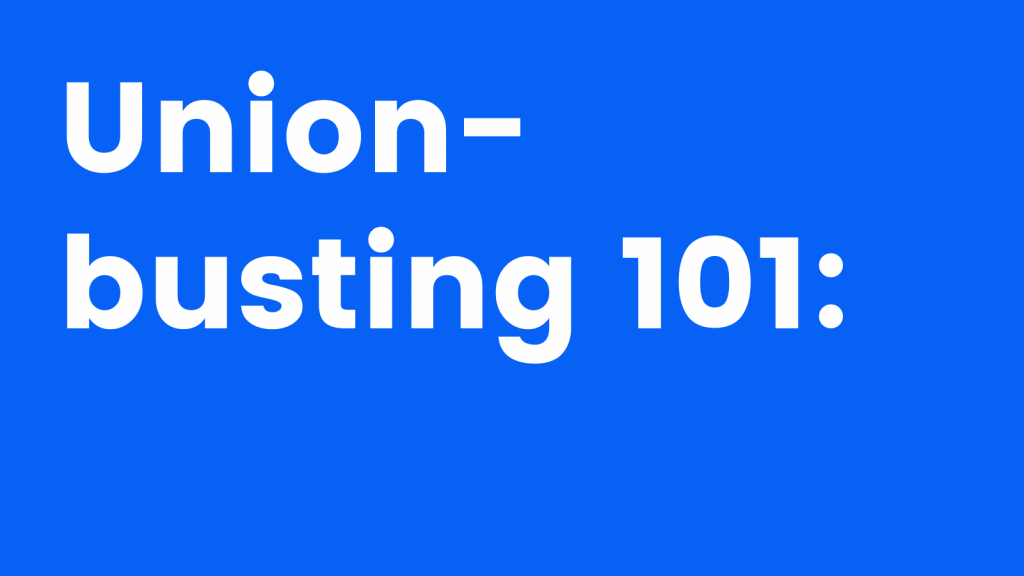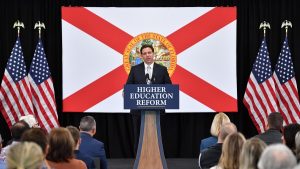Support for unionization is at an all-time high, with 68% of all Americans and 77% of those ages 18-34 in favor of unions, according to a Gallup poll. While most recent NLRB filings are from Starbucks workers, higher education unions are on the rise as well. Since the NLRB withdrew a proposed rule that would restrict graduate student workers at private universities from unionizing in 2021, there has been an explosion of new activity among that sector, as well as among adjunct faculty. Among undergraduates, the Union of Grinnell Student Dining Workers won an election earlier this year to expand their bargaining unit to all hourly undergraduate workers on campus.
I attended Jackson-Lewis’s webinar designed for university administrators who are worried about unionization on their own campus, to see what they had to say. Now, since they allowed me into the webinar and allowed all attendees to download their slides, I am going to share what I learned with all of you.
While this information will be most useful for unions still in the pre-election stage of organization, there are many tactics that universities can use to fight unions at any stage of the process, including during contract negotiations. Use this information to learn how to identify universities’ more subtle union-busting tactics and inoculate members of your bargaining unit accordingly.
Unionization in College Athletics
The three groups of higher education workers that Jackson-Lewis thinks are ripe for organizing are athletes, graduate students, and adjunct faculty.
Between October 1, 2021 and May 31, 2022, there were 29 higher education union petitions filed with the NLRB, and the union won every single one of them, except for those whose elections are still pending or in a couple of cases when the union withdrew the petition to refile later. Universities and “no” votes did not win a single time. Not one.
The webinar was split into two sections, one focused on college athletics, and one focused on graduate students and adjunct faculty. During the first section, the lawyers referred to a recent memo released by the NLRB General Counsel recognizing athletes employed by colleges as workers who are eligible to unionize and warning that the term “student athletes” might constitute an unfair labor practice, since it obfuscates the athletes’ material relationship with their employer. NLRB rulings only apply to athletes at private colleges and universities, but the Jackson-Lewis lawyers noted that state labor authorities frequently defer to NLRB guidance when determining eligibility for workers at public institutions.
The Jackson-Lewis team argued that now is an opportune time for college-level athletes to unionize, given the current NLRB’s relative sympathy, and universities should take steps to preemptively ward off potential unionization. They warned that the two biggest motivators for unionization are lack of transparent communication and poor working conditions, so universities seeking to prevent unionization should address those first.
Jackson-Lewis’s “actions to take now” for universities1Text in quotation marks is taken directly from the webinar slide deck worried about athlete unionization include:
- Training coaches and other supervisors regarding current labor law (their rights and responsibilities as well as what counts as unlawful conduct and the implications of such unlawful conduct) and “the reasons that players may consider union representation and/or protected concerted activity and how to preclude those conditions from arising”
- Improving communication between players and the institution
- Improving safety, medical care benefits, and academic support offered to players
- Reviewing all written materials (like handbooks) given to players to check for labor law compliance
- “Review parameters for player use of email and other institution facilities and access to institution footprint by non-employees (e.g. union organizers)”
- Prepare internal and external position statements
The important takeaway here is that improvement in working conditions for players in the coming weeks and months is likely not a sign of a caring employer, but an attempt to defang any attempts at unionization among players, similar to how Princeton University voluntarily raised stipends for graduate students shortly after the Student Workers of Columbia (SWC-UAW) won significant raises after a 10-week strike.
For high-profile sports like basketball and football, in which games are televised, organized players could choose to go on strike right before a game is scheduled to begin, wielding enormous power against not just the university, but also advertisers and media companies like ESPN. Universities are highly incentivized to prevent worker organization from occurring at any cost. Universities see giving up small concessions as a way to prevent potential bigger losses they could face at the hands of more extensive organizing.
Jackson-Lewis also recommends that for teams where only some players are on scholarship, universities use this to their advantage by pitting non-scholarship players against those who are paid. A team that wants to unionize should be on the lookout for this tactic and inoculate against it, such as by making pay for all players one of their demands.
Graduate Students and Part Time Faculty
The second half of the webinar focused on union-busting topics related to graduate student workers and part-time faculty, also known as adjuncts.
Mike Bertoncini, who is currently representing Fordham University in bargaining with Fordham Faculty United, led this part of the webinar. He began by describing some common lines of reasoning that adjunct faculty unions use, such as that universities do not pay adjuncts a living wage. To this, Bertoncini said, “Their math is not wrong on that.”
Even just this first example showcases how little regard union-busting lawyers have for the very real plight of the workers they are trying to oppress. He acknowledges that we make poverty wages in private, when speaking to university administrators, but ignores these facts in the bargaining room and presents proposals that do nothing to fix the problem.
He also noted two new trends among graduate student organizing: demands for much more comprehensive and specific protections against sexual harrassment and health benefits that specifically cover mental healthcare. Bertoncini remarked that he isn’t sure if this last part — urgent mental health needs of student workers — is genuine or if it is a cynical bargaining tactic. He said he personally thinks it is the result of limited appointments at campus health centers.
Such an assumption shows his blatant disregard and disdain for graduate workers’ sincerity and material situation; a 2018 study found that graduate students are six times as likely to experience depression and/or anxiety compared to the general population. It also relies on the false idea that even the most well-funded campus health center can provide for everyone’s needs. Bertoncini gave this webinar a day after a bargaining session with Fordham Faculty United in which one adjunct faculty member, according to the union’s public bargaining bulletin, shared that they spend $1,400 per month on speciality mental healthcare because there is only one practice in New York City that provides the necessary services.
Besides naming frequent concerns that unions bargain around, the webinar also noted that solidarity and support from students, tenured faculty, and other groups of campus employees are two powerful tools that unions use to win a campaign; therefore, universities should try to drive a wedge between a bargaining unit and these other groups. Faculty and graduate students who want to unionize must resist all such attempts and provide political education to the campus community about how their union effort would benefit not just themselves, but also everyone on campus.
Other union-busting strategies to watch out for that Jackson-Lewis specifically designed for a university setting include:
- Choosing anti-union communicators that are generally considered well-liked or friendly by the prospective bargaining unit
- Avoiding explicitly anti-union language, since that’s a turnoff for faculty
- “Shaping the unit” – either stacking the prospective bargaining unit with anti-union members (such as hiring a lot of full time professionals as adjuncts in the business school, since business school faculty are less likely to be pro-union) or by making arguments for why certain kinds of faculty (like those who teach exclusively online, for example) ought to be excluded from the bargaining unit
- Preemptively improving working conditions, including compensation, job security, pay parity, availability of professional development funds, and more
- Preventing the union from controlling the narrative around the issues
- Pointing out negative qualities of existing collective bargaining agreements at other campuses to illustrate the limitations of unionizing.
This last point might be the most insidious, since it is precisely Jackson-Lewis and similar firms that are responsible for low-quality contracts at other institutions and is a false comparison, since these contracts are still better than the conditions the workplace had before unionization. This recommendation also illustrates the system-wide logic of union-busting: every bad contract that is ratified provides more fuel for union-busting campaigns at other workplaces, just as every good contract provides inspiration and guidance for other unions. Unionizing workers are never just fighting for themselves — the outcome of their struggle impacts other workplaces in their industry as well.
I am writing this because I want all unions, present and future, to be aware of the tactics universities are being told to use against them, and to feel reassured that what we suspect — that our employers give us concessions out of fear that we will organize and ask for more — is accurate and explicit in their internal conversations.
If you would like to get a copy of the slides yourself, contact us at [email protected].
Notes
| ↑1 | Text in quotation marks is taken directly from the webinar slide deck |
|---|











